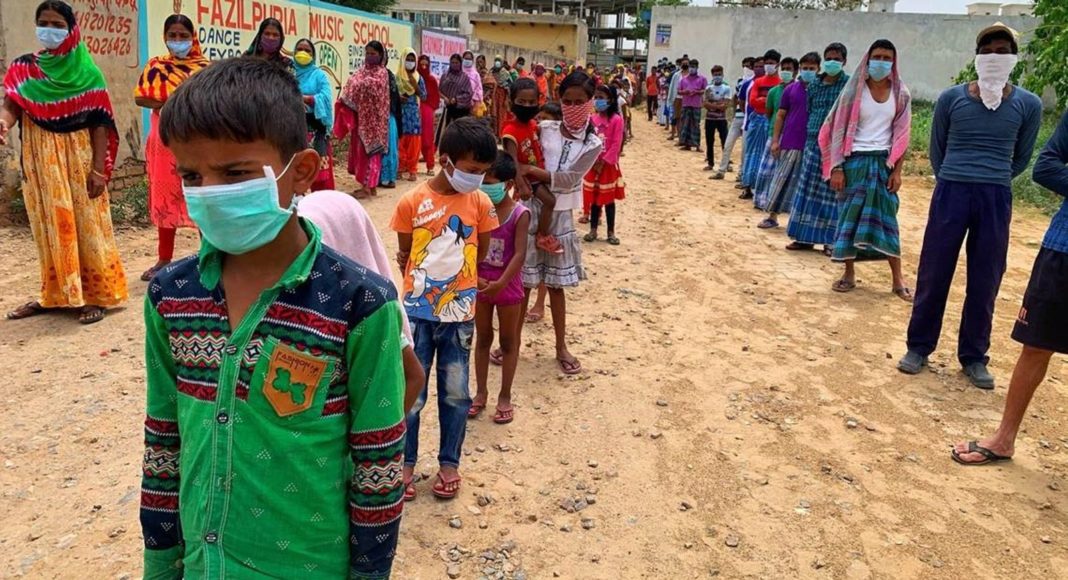Millions of Indians who have been without work for weeks are facing hunger as the country battles the coronavirus outbreak.
The most vulnerable are daily wage earners, contract workers and migrant labourers who have been without work and earnings since the country was shut down on 25 March.
It comes as World Food Programme analysis suggests an additional 130 million people around the world “could be pushed to the brink of starvation by the end of 2020” as a result of the COVID-19 pandemic.
Da Beasley, the executive director of the World Food Programme, has warned the UN Security Council that the world is “on the brink of a hunger pandemic” that could lead to “multiple famines of biblical proportions”.
Hundreds of men, women and their children have been waiting in the blazing sun for a precious meal in Gurgaon on the outskirts of the Indian national capital Delhi.
Image:
Families are struggling for food in Gurgaon on the outskirts of Delhi
Mujibur, a labourer, is there to pick up a hot meal for his wife Mariam who gave birth to a baby boy during the shutdown.
It is past midday and this is the first meal she will eat until dinner time.
She said: “It’s a big problem for me, there is no food, no money and I have a baby, I am very worried about him. Whatever is given to us that’s all I eat the whole day.”
The biggest problem they all face is the availability of food and rations.
For weeks they have been without any work and most have exhausted their savings.
The shutdown has stripped them of everything including their dignity.
Hundreds here live in clusters of one-room homes, some even in tin sheds and huts made of plastic sheets and bamboo.
They are labourers, masons, drivers, maids, cleaners, guards and vegetable sellers that cater to thousands of homes and high-rise apartments that dot this cyber city.
Image:
Mariam, left, and Mujibur with their child who was born during the lockdown
Image:
Mariam said she has been worried about her baby’s health
Lalla Bai, a daily wage labourer, left her two children in the village to come here to earn a living.
Desperate to go back home, she said: “We are angry with the government, they are starving us. Neither are they killing us nor are they allowing us to live. We are stuck in the middle. I cannot go back to my children.”
She insists we come inside her bamboo and plastic sheeting hut.
It’s stifling as the temperature is already touching 40C (104F) and this is just the beginning of the long summer.
Social distancing is a privilege these people cannot afford.
Image:
Lalla Bai has said she is angry with the government over the lockdown measures
:: Listen to the Daily podcast on Apple Podcasts, Google Podcasts, Spotify, Spreaker
Jamshed lives with his wife and four children in a room with its roof and three sides made of tin sheeting.
A daily wage earner, he came to the city three months ago and regrets his decision.
“Food is the biggest problem and since there is no work I have no money to buy anything,” he said.
Tanuja, a 36-year-old cleaner, broke down as she said: “This disease has crushed us. I have no work, no food, no money to pay rent. My children are in the village and I have to send them money. What will I do.”
The common washing areas coupled with unhygienic living conditions and a lack of personal protection means the pandemic would ravage this cluster.
The informal sector of daily wage earners, contract workers and migrant labourers form almost 81% of the country’s working population.
Image:
Jamshed, pictured her with his family, has no money to buy food during the shutdown
Image:
Tanuja, a cleaner, said the disease has ‘crushed us’ as she has no food
The government has set up thousands of relief camps where free food and shelter is proed to the poor and migrants who are stuck.
But with the overwhelming numbers, not everyone can be reached all the time.
Two days into the lockdown, Vishal Anand, a restaurant owner, was stopped in his car by people asking for food.
He said they were “not beggars, but skilled and unskilled workers and they just wanted food”.
Mr Anand pooled his finances and with a group of his friends and volunteers started a kitchen making thousands of hot meals.
With limited resources the idea was to proe the most vulnerable with food for only for a few days until the administration stepped up.
But with the overwhelming numbers of hungry people they were unable to stop.
Image:
Restaurant owner Vishal Anand has started a kitchen making thousands of hot meals
Mr Anand told Sky News: “As citizens the first thing I believe in is that we need to help other citizens. The most important thing we have to do is to secure them with basic food and rations for the next 90 days. We really don’t know when the lockdown will be over and when they will get back to their respective jobs.”
With the help of some charities, donations and the administration, he and his friends are making life a bit easier for the thousands of the forgotten poor.
It’s an uncertain future for this vast, invisible majority, many desperate to get back home to their families.
Geeta, from Panna in Madhya Pradesh, said: “Our children are dying of hunger at home and we here, we have nothing here. We want to go back. Our children will die there and we will die here.”




